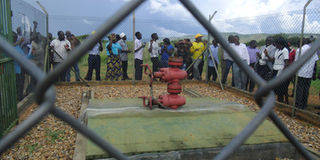Bunyoro youth demand oil opportunities

Youth leaders at an oil well in Hoima district recently. Photo by Francis Mugerwa
Youth leaders in the oil-rich Bunyoro region have demanded for exposure to commercial opportunities in Uganda’s oil and gas sector.
“There is need for oil companies and Government to link us to procurement and supply opportunities because there are many youth with goods and services but they do not know the procurement cycle of the oil companies” said Gilbert Tibasiima, the Buliisa district Youth chairman.
The youth tabled their demands during a youth entrepreneurship training at Hoima Resort Hotel in Hoima district.
The training was organized by Kitara Development Initiative (KITADI) with support from Action Aid Uganda.
John Kusiima, a poultry farmer says he has over 500 birds that can be consumed by oil workers.
“But I have not yet got any opportunity to supply poultry products to the oil industry. Let me continue expanding my project with hope that one day I will get an opportunity” said Kusiima, a resident of Hoima district.
Jackline Ayesiga, a youth from Kirasa LCI in Masindi Municipality who operates a coffee Nursery bed is promoting commercial coffee growing in Masindi district.
She says her ambition is to have a coffee processing facility that can supply coffee to oil workers and the local communities.
The Hoima District Vice Chairman Mr Fredrick Kakoraki however argues that people in Bunyoro have started benefiting directly and indirectly. He says business is booming due to economic developments that have been triggered by oil developments.
“Let us prepare ourselves enough so that we tap whatever opportunities come our way,” Kakoraki said after some youth complained that they missed out on economic opportunities during the oil exploration and appraisal phase.
He urged the youth to improve on their skills, preparedness and innovation in order to tap the emerging opportunities of the oil sector.
Action Aid Uganda which works to achieve social justice, gender equality and poverty eradication underscored the need for stakeholders to manage expectations of the public and pay attentions about concerns of the less privileged.
Mr Didas Muhumuza, the Extractives Governance Coordinator at Action Aid Uganda said Youth should be proactive in tapping into oil related opportunities.
He said there is a lot of information regarding opportunities and many stakeholders including government of Uganda, Oil companies, development partners, civil societies such as ActionAid Uganda among others are doing their best to enable access to information and capacity building to enable young people access opportunities in the oil and gas sub-sector.
“Young people are a special category requiring special targeting since they constitute over 78% of the population yet about 65% of the youth are unemployed. When connected to opportunities in the oil and gas sub-sector and other productive areas, such efforts help in managing the challenge of unemployment among the young people,” Muhumuza said.
Mr Good Kaija, a Senior Community liaison supervisor at CNOOC Uganda, one of the oil companies licensed to produce oil said many local entrepreneurs benefited from the supply of goods and services during the oil exploration and appraisal phase.
He advised youth to register in the National Suppliers data base and talent register at Petroleum Authority of Uganda (PAU). He said oil companies engage only companies that are registered in the National Suppliers data base and talents register (NOGTR).
The Petroleum Authority of Uganda has developed a National Oil and Gas Talent Register to capture all talent that can potentially work in the oil and gas sector as required by law.
The NOGTR is a register classified into the demand and supply side users. The demand side users consist of companies/government agencies which meet the eligibility criteria seeking to recruit human resource across projects in the oil and gas sector and redeployment of the same to other sectors.
On the other hand, the supply side users include individuals who meet the eligibility criteria for the workforce demands of the oil and gas and are likely to be recruited by the demand side users.
The NOGTR registration process is compiled and maintained annually for both the demand and supply side users.
Uganda’s oil and gas sector has transitioned from the exploration and appraisal phase to the development phase in preparation for sustainable production of the petroleum resources that have been discovered in the country. Oil explorers have so far discovered 6.5 billion barrels of oil in the Albertine graben.




